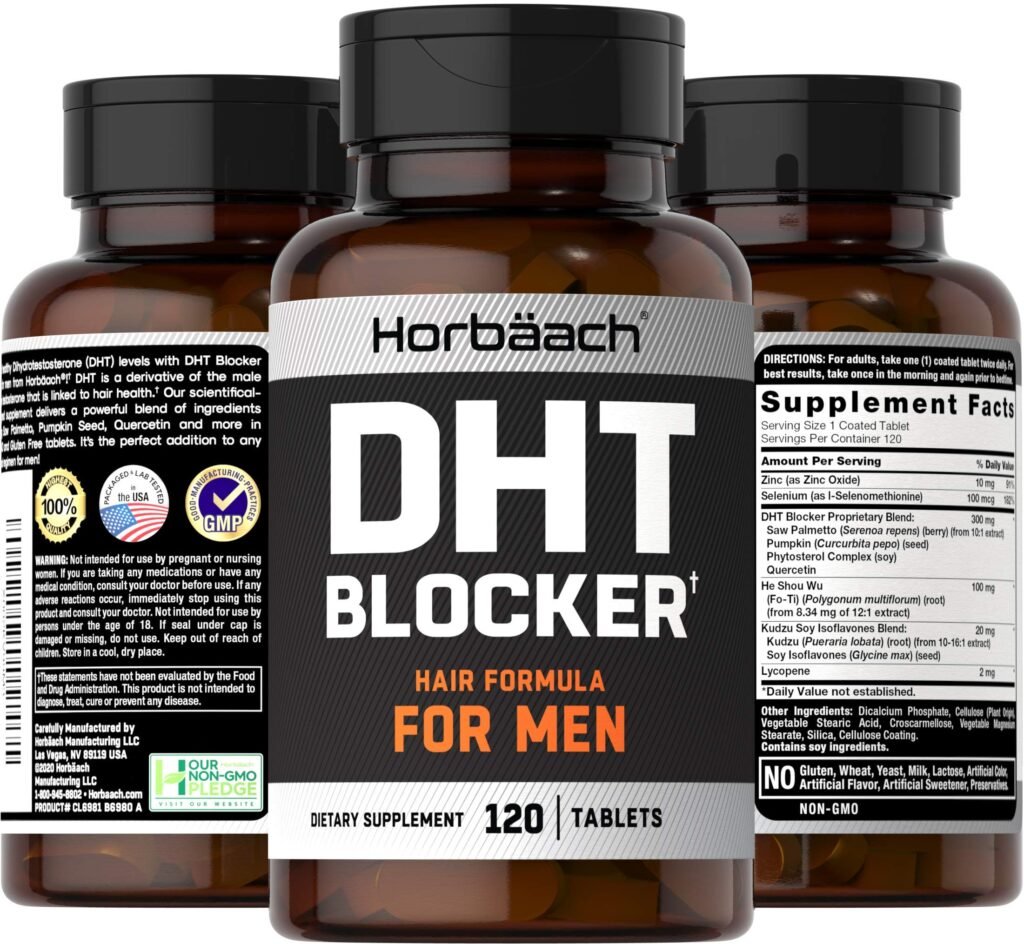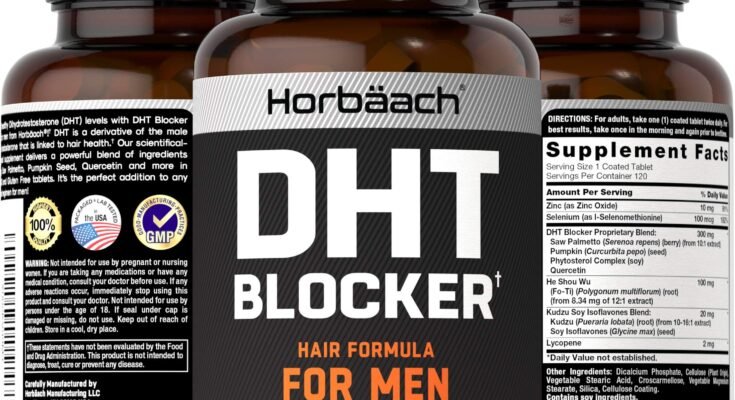Most people would generally find that losing hair could be a psychologically stressful and terrifying enterprise. It is even popularly known that the major reason behind this problem is Dihydrotestosterone, commonly referred to as DHT. This is especially true for men and women suffering from androgenetic alopecia, otherwise known as pattern baldness. DHT blockers potentially offer an alternate approach to combat hair loss. We will discuss defining DHT blockers, their functioning, benefits, and common questions about them.
What Are DHT Blockers?
A DHT blocker is a substance that prevents DHT from attaching to the hair follicles. Testosterone produces DHT, which shrinks hair follicles, leading to hair thinning and eventual hair loss. The purpose of these products is to block the effects of DHT that cause hair loss and stimulate hair growth.
How Do DHT Blockers Work?
DHT blockers work by inhibiting the enzyme 5-alpha-reductase, which catalyzes the conversion of testosterone to DHT. Reduced formation of DHT in the scalp protects the hair follicles to some degree. This allows them to be healthy enough to thrive and produce enlarging hair.
Types of DHT Blockers
There are mainly two types of DHT blockers:
1. One is natural blockers such as saw palmetto, pumpkin seed oil, and green tea extract. People generally tolerate natural options well, and they have fewer side effects.
2. The other is synthetic blockers, which include medications such as finasteride or Propecia and dutasteride. These are available by prescription only and are highly effective in reducing levels of DHT. Highly effective, yet they are weighty drugs and with multiple potential side effects like hormonal imbalances and/or decreased libido.
Benefits of DHT Blockers
Though the full range of DHT blockers operates on basically the same level, nonetheless, experts have singled out the following functions.
I. Hair Loss Prevention: DHT blockers can stop or slow the progression of thinning and loss of hair.
II. Promotes Hair Growth: By lowering DHT levels, the follicles get a chance to regenerate, producing thicker, shinier strands.
III. Accessible Solutions: Options like topical treatments, shampoos, and oral supplements make these blockers convenient to use.
IV. Offers Convenient Options: These solutions include topical treatments, shampoos, and oral supplements, catering to different preferences.

Possible Side Effects of DHT Blockers
While most commonly and naturally available DHT blockers are considered safe for use, synthetic alternatives present with some of the side effects, such as:
1. Hormonal Changes
- DHT blockers exert their action by inhibiting the conversion of testosterone to dihydrotestosterone (DHT). Such alteration in hormonal levels sometimes alters the balance of other hormones in the body.
Potential Effects
- Mood Swings: A few persons might experience changes in patterns of their moods, that is, irritability or minor depression due to fluctuating levels of testosterone.
- Gynecomastia: In rare instances, imbalance in hormones causes breast tissue to develop in men.
- Diminished Libido: Others may witness changes in their libido.
Mitigation
Checking of hormonal levels with the physician, hence adjusting dosages, if required, may help in modulating these changes.
2. Sexual Dysfunction
- Users commonly report sexual dysfunction as a side effect of DHT blockers, particularly finasteride or dutasteride.
Potential Effects
- Erectile Dysfunction: Some difficulty in gaining or maintaining an erection.
- Decreased Ejaculatory Volume: Some may experience a reduction in the amount of semen during ejaculation.
- Loss of Sensation: In some cases, patients may report a decrease in sexual sensitivity.
- Reversibility: Most effects should revert with the cessation of the DHT blocker, although RARE instances of persistence after discontinuation do exist-a condition often dubbed post-finasteride syndrome (PFS).
- Mitigation: Support from a physician for dosage changes or alternate therapies can address such a problem.
3. Allergic Reactions
- Some are prone to develop allergic reactions to DHT blockers, although these cases are rare, especially when the person is hypersensitive to any of the active or inert ingredients of the drug or supplement.
Symptoms include
- Skin Reactions: skin rashes, itchiness, or hives.
- Difficulty with Breathing: breathing issues, or swelling in the throat, lips, or tongue requiring immediate medical help.
- Digestive Upset: nausea and stomach cramps, or diarrhea upon oral ingestion in some persons.
Mitigation: Always check the ingredient listings. In case of allergic reactions, discontinue use and consult a healthcare professional without delay.
Note Before Using DHT Blockers
- By and large, many of the side effects of the DHT blockers involve include mild symptoms that will reverse when the drug is ceased in nature, although they depend greatly on an individual and on the kind of blocker used.
- Always consult a medical professional before starting any DHT blocker for risks, benefits, and proper use.
- After leaving the clinic, the aim of the doctor is to keep track of side effects and report them to the consumer in due time to ensure proper and safe treatment.
Conclusions
Blocking DHT provides an enticing chance at halting hair loss, raising hope in those tormented by thinning hair or receding hairlines. A well-merchant DHT blocker works on the key issue of DHT, which could protect the already existing hair and stimulate the regrowth of hair. They are useful to many but require a thoughtful choice of a proper product and consultation with a healthcare professional to ensure its appropriateness and safety, thereby limiting possible side effects. Investing in an adequate hair care routine would go well with lifestyle modifications gearing you towards healthier, thicker, and more confident days to come.




